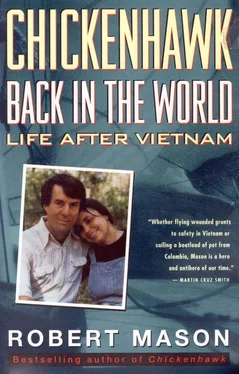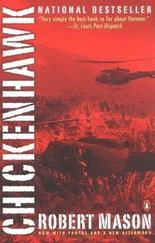Robert Mason - Chickenhawk - Back in the World - Life After Vietnam
Здесь есть возможность читать онлайн «Robert Mason - Chickenhawk - Back in the World - Life After Vietnam» весь текст электронной книги совершенно бесплатно (целиком полную версию без сокращений). В некоторых случаях можно слушать аудио, скачать через торрент в формате fb2 и присутствует краткое содержание. Год выпуска: 2013, Издательство: BookBaby, Жанр: Старинная литература, на английском языке. Описание произведения, (предисловие) а так же отзывы посетителей доступны на портале библиотеки ЛибКат.
- Название:Chickenhawk: Back in the World - Life After Vietnam
- Автор:
- Издательство:BookBaby
- Жанр:
- Год:2013
- ISBN:нет данных
- Рейтинг книги:3 / 5. Голосов: 1
-
Избранное:Добавить в избранное
- Отзывы:
-
Ваша оценка:
- 60
- 1
- 2
- 3
- 4
- 5
Chickenhawk: Back in the World - Life After Vietnam: краткое содержание, описание и аннотация
Предлагаем к чтению аннотацию, описание, краткое содержание или предисловие (зависит от того, что написал сам автор книги «Chickenhawk: Back in the World - Life After Vietnam»). Если вы не нашли необходимую информацию о книге — напишите в комментариях, мы постараемся отыскать её.
Chickenhawk: Back in the World - Life After Vietnam — читать онлайн бесплатно полную книгу (весь текст) целиком
Ниже представлен текст книги, разбитый по страницам. Система сохранения места последней прочитанной страницы, позволяет с удобством читать онлайн бесплатно книгу «Chickenhawk: Back in the World - Life After Vietnam», без необходимости каждый раз заново искать на чём Вы остановились. Поставьте закладку, и сможете в любой момент перейти на страницу, на которой закончили чтение.
Интервал:
Закладка:
“Well, it was by accident,” Baker said. “The relief guards showed up early, and in a few minutes they were chasing this Seal guy down with patrol boats, searchlights, loudspeakers telling him to stop, all that. He wouldn’t. They had to shoot the boat to splinters, blow up the engine, to get him.” Baker shook his head in admiration. “Not many people like him in the real world.”
As February drew near, I began to look forward to my first furlough, one day in the local area. John and I had both applied, our wives had requested the furlough, all things that had to be done were done. We waited.
John got his approval and came to my new cube in Dorm Five to tell me. I checked the bulletin board. Nothing. I went to the counselor’s office and waited in the hallway. After an hour wait, I asked Waterhead what had happened. “They wouldn’t approve it. You’re considered a high-profile prisoner, Bob. They’re afraid the press might make a big deal about the furlough program if they let you go,” Waterhead said, not able to look me in the eye.
I met John in the mess hall and told him. He looked very upset. He was caught in the middle of one of the few good things that could happen to you at Eglin, a furlough, and a bad thing: his codefendant and friend was denied the same furlough. We ate in silence.
I walked longer than usual that evening and went to bed early. The next day, at lunchtime, I went into Waterhead’s office and told him, “This is about the most chickenshit operation I’ve ever seen. You idiots furloughed the captain of the fucking boat I was on as a crew member, a man who’s got a third longer sentence than mine, and refused to furlough me because I wrote a book. You are all assholes.” Waterhead said nothing. I slammed his door as I left.
I still didn’t feel any better, though.
Patience and I visited in the visiting room while John and Alice stayed at the beach.
The next possible furlough was in August.
I felt nails going into my skull, over my left eye, and went to the infirmary. They gave me Cafergot, a drug that constricts blood vessels. The pain vanished. The side effect of the drug is nausea, which, in comparison, is a delight.
I saw Johnson, the Seal, buffing the floor while I was at the infirmary. I asked him how he was doing. He said fine, they had him on Thorazine. “That makes me feel calm, sir.” I nodded. When I left, I saw Johnson still buffing the hall, face placid. He’d already polished the whole length of the hallway to a gleaming mirror finish; he had now started over.
I went to work.
Officially I was the inmate in charge of the clothing room, but Foster seemed to be getting the perks. For one thing, he got Post Raisin Bran at breakfast when no one else could. I tried being right behind Foster in the breakfast line, but there was never any Raisin Bran when I got to the bin. I asked Foster about it.
“I make a deal here, a deal there,” he said.
I didn’t know what he was talking about. I spent nearly every minute at work working. I didn’t have time to make deals. And what kind of deals could I make anyway?
“Rags are good,” Foster said.
“Rags?”
“Yeah,” Foster said, nodding toward an inmate kitchen worker. “See that rag hanging out of his pocket?”
I looked. Sure, all the guys who worked in the mess hall had rags to wipe the tables and stuff. “Yeah. What about them?”
“Where do you suppose those rags come from?”
Foster, a wealthy businessman on the outside, was a rag broker in Eglin?
“I wouldn’t be telling you about this, Mason, except I’m leaving in a month. I might as well let you in on some of my contacts.”
After we ate, Foster took me back behind the serving counter, into the mess hall kitchen, and introduced me to the hack who ran the place, Evans. Evans nodded when Foster told him I was taking his place. “He can get the rags?” Evans asked.
“Yeah, I’m setting him up today.”
“Good. We need some. Like yesterday.”
We walked out the back door of the kitchen, onto the service road, and up to the clothing room. “Mason, I know you’re a capable guy, but you don’t seem to get it, you know?”
“Get what?”
“That’s what I mean. You’re all the time typing and doing your job. You’re blind to the action going on all around you.”
“Action?”
“You’ll see.”
Foster took me on a tour of my own clothing room. We went back to the three washing machines. Two guys were there washing clothes. “Now, who do you suppose these clothes are for?” Foster asked.
“I don’t know. Never cared.”
“Well, people pay for the service, Mason. Some guys don’t want their clothes washed in with all the other who-knows-what’s-in-them stuff. They want their stuff hand washed and ironed separately. We provide the service, and we all get presents from the commissary.”
I’d heard how the payment plan worked. No inmate was allowed to have more than ninety dollars sent to him in a month. Some of the richer inmates would enlist the services of poorer inmates as “shoppers.” The deal was that the shoppers would receive ninety a month, every month, half of which was theirs to keep. To earn their forty-five bucks, the shoppers had to go shopping for their benefactors. Some of the richer inmates, I was told, had as many as ten shoppers because they spent heavily in the nightly poker games. Foster and his employees were getting paid in cigarettes, ice cream, and tennis shoes. There were other services. When I moved into Dorm Five, I noticed that one inmate never made his bed or swept out his cube in the morning; he just dressed and walked out. Two guys who cleaned the dorm would come in every morning and straighten his cube up to inspection level in five minutes—made the bed, even vacuumed the carpet.
Foster called one of the laundry guys over. “Stevie. Bob here’s gonna take over for me when I’m gone.”
Stevie nodded.
“Evans says we need more rags,” Foster said.
“When?”
“I’d like to have a couple of bundles this afternoon.”
“You got it,” Stevie said.
As we walked back to the office, Foster told me the rags came from the sheets the inmates turned in every day. They washed them with lots of Clorox and ripped them to dish towel size. In time, the rags were washed again and again, eventually wearing out. They just converted more sheets.
“Doesn’t anybody ever miss the sheets?” I asked.
“Sure. Like on the largest Air Force base in the world, they notice they’re short a few hundred sheets a year out of a million.”
I nodded. “Right.”
That afternoon, Foster came to my desk to get me. He’d been cool to me since I’d arrived, but now that he’d decided to pass his operation on to me, he took to it with enthusiasm. We went back to see Stevie and got the two bundles of rags, all folded and tied and packed in mattress liners. As we walked down the service road, Foster wanted to know what I wanted the kitchen to do for me.
“Raisin Bran.”
Foster laughed. “You noticed, eh? No Raisin Bran in the serving line?”
“Right. That’s what I want.”
We gave the rags to an inmate who was waiting for them.
The next morning, I went to breakfast as usual, except that when I got in the serving line I noticed one of the inmate kitchen workers behind the coffee um nod slightly. I got a tray and scooted it along the rails. People ahead of me were asking for Raisin Bran. One guy said, “Out? How can you be out? The stuff comes in an assortment. See the box?” the inmate says, pointing behind the counter. “Says Post Assortment Pack. But you’re always out of Raisin Bran, no matter how early I get here.”
“I don’t know why,” said one of the servers. “Talk to Post’s legal department.”
Читать дальшеИнтервал:
Закладка:
Похожие книги на «Chickenhawk: Back in the World - Life After Vietnam»
Представляем Вашему вниманию похожие книги на «Chickenhawk: Back in the World - Life After Vietnam» списком для выбора. Мы отобрали схожую по названию и смыслу литературу в надежде предоставить читателям больше вариантов отыскать новые, интересные, ещё непрочитанные произведения.
Обсуждение, отзывы о книге «Chickenhawk: Back in the World - Life After Vietnam» и просто собственные мнения читателей. Оставьте ваши комментарии, напишите, что Вы думаете о произведении, его смысле или главных героях. Укажите что конкретно понравилось, а что нет, и почему Вы так считаете.












